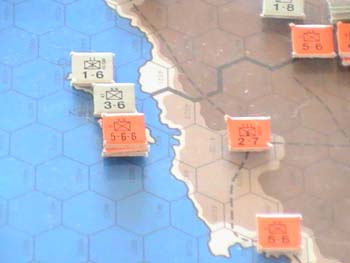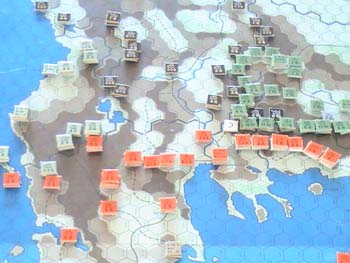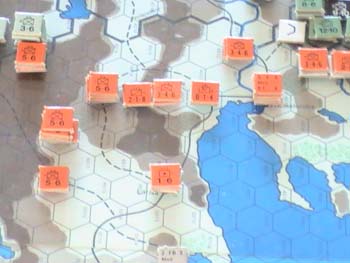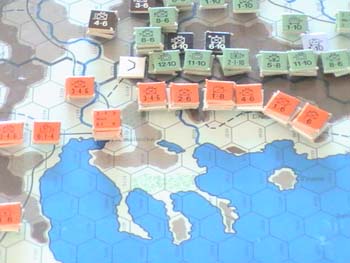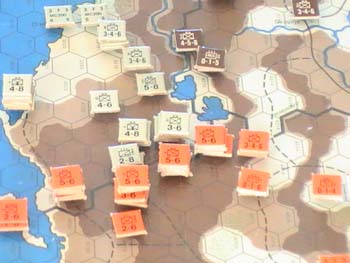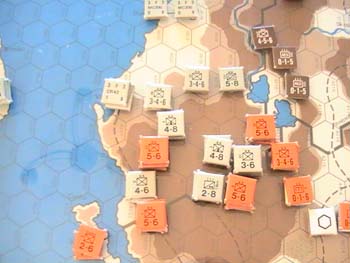Rule
30 - Borders
A. Rumania and Bulgaria. While both these
countries allowed the Germans to operate from their territory, neither participated
in the campaign with their own military formations. The Allied countries were
careful not to provoke active participation by these countries. Furthermore, both
kept sizable contingents guarding their borders. In light of these factors, units
of the Allied player may not enter either Rumania or Bulgaria.
B. Germany
and Italy. The formations guarding these nations' borders with Jugoslavia
have not been included in the game. The effect of these units is the following:
Jugoslav ground units may not enter Germany or Italy.
C. Hungary.
Unlike Germany's other Balkan allies, Hungary did actively participate in the
campaign. Thus, the Hungarian armed forces have been included, and there are no
restrictions against Allied units entering Hungary. Hungary had more concerns
than just this campaign; to reflect this, two Hungarian divisions must be placed
on border guard status. These two units may neither attack nor leave Hungary.
D.
Greece. With decades of animosity between Greece and Bulgaria, the Greek government
was concerned over the possibility that Bulgaria would join in Italy's invasion
of Greece. For Marita-Merkur, this means that all Greek units on the mainland
east of the Axios River (the river running from the Jugoslav border to the hexside
adjacent to Thessalonike) may not move west of that river until:
1. Every hex
of the Metaxas Line is occupied by an Allied unit; and
2. There are at least
thirteen regimental equivalents of infantry, artillery, and/or engineers in the
Metaxas Line.
E. Albania. One Italian division must remain in Albania,
north of Tirane, guarding the Albanian-Jugoslav border. It must remain there until
Jugoslavia becomes a participant in the war, after which the division may ignore
this restriction. The division does not have to be adjacent to the border.
F.
Zara. Two Italian units are initially deployed at Zara. These units are the
city's garrison, and may not leave Zara until Jugoslavia has entered the war.
G.
Borders and Zones of Control.
1. Jugoslavia. ZOC's do not extend across
the Jugoslav border, in either direction, until that country is invaded. When
invaded, Axis ZOC's extend into Jugoslavia immediately. Jugoslav ZOC's only extend
into the Axis nations after the completion of the German special invasion turn
(i.e., at the start of the regular Axis player turn).
2. Rumania and Bulgaria.
Since German units were permitted to operate within Rumania and Bulgaria, these
units do exert ZOC's in and from both nations. However, Allied units do not extend
ZOC's into either.
3. Greece. The Greek army, aware of the possibility of an
Italian invasion, maintained a careful and active surveillance of their border
with Albania. Accordingly, Greek ZOC's do extend into Albania from the start of
the game.
Rule
31 -Special Rules
A. Greek Mountain Capability. Greek
units attacking into any mountain hex have their combat resolution die-roll modified
by +2. This is in addition to all other modifications. Note that Greek non-mountain
units attacking into a mountain hex are halved, as indicated on the Terrain Effects
Chart. Greek units do not have any special abilities for moving or defending in
the mountains.
B. Gulf of Corinth. A secondary transportation line
crosses the Gulf of Corinth at hexes 0418 and 0519. Units of either player may
cross the Gulf using this line; there is no extra movement cost to do so. Units
may not attack across the Gulf of Corinth, including at the secondary line crossing
point.
C. Corfu. The Italians had made preparations for an amphibious
invasion of the island of Corfu. Accordingly, the Axis player may treat the 4521/4522
hexside as a river hexside, for both movement and combat, as long as the Italian
marine battalion (I I I/SM) is adjacent to the hexside.
D. Jugoslav
Coup. Balkan politics are, to put it mildly, complex. Glossing over the details,
political factions within Jugoslavia had long been concerned and unhappy with
the steady expansion of Axis influence and control across Europe. Believing that
the Axis cause had begun to wane (as signified by the consistent failure of Italy
in Greece and Albania) and encouraged by British promises of assistance, these
factions overthrew the Jugoslav government and reversed its previously pro-Axis
policies.
In play, the Allied player begins checking for a coup in Jugoslavia
on the game turn that both of the following occur: 1) the Allied victory point
total is at least twice that of the Axis; and 2) the Allied player has a total
of at least 30 victory points. Once this occurs, the Allied player checks for
a coup every game turn until the coup occurs or German intervention is triggered.
The coup will not happen after Germany becomes an active participant in the Balkans.
The
Allied player checks for the coup immediately following each turn's victory point
calculation. One die is rolled twice, adding the numbers together. Modify this
sum by +3 if there are three or more regimental equivalents of British/Commonwealth
units on mainland Greece and the Allied victory point total is at least twice
as great as that of the Axis. If the final sum is 11+, a coup has occurred.
After
the coup, the Allied player may freely move Jugoslav units within Jugoslavia.
However, Jugoslavia remains neutral: no unit may move outside Jugoslavia or attack
across the border. Allied units may not enter Jugoslavia. These restrictions are
lifted when and if the Axis invades Jugoslavia.
E. German Units.
Italian plans for the invasion of Greece had been kept secret from the Germans,
for fear that Hitler would not sanction any action in this region of Europe. Accordingly,
the invasion took the Germans by surprise, a quite unwelcome surprise when the
Greeks repulsed the attack. The fierce Greek resistance raised the spectre of
British armed presence in the Balkans, a possibility that the Germans could not
tolerate. At first planningto send some units to Albania to assist the Italians
(Fall Alpenveilchen - Case Mountain Violet), Hitler was convinced by the steadily
deteriorating situation in the Balkans that full-scale intervention was the only
acceptable solution. Marita-Merkur reflects these factors in the following rules.
1.
Assistance. Throughout the rules, reference is made to German intervention. Units
arriving under the provision of this paragraph do not constitute intervention.
At the end of each turn, following the computation of victory points, if total
Allied victory points exceed but are not twice the total of the Italian player,
roll for German assistance. On a roll of 4, 5, or 6, German assistance is sent;
roll again and consult the following chart. The Axis player may select any unit
described on the chart up to the limits of the counter mix. If the supply of a
specified type of unit is exhausted, roll again until a unit that is available
is rolled.
German Assistance Chart
Die roll Unit received
1-3 one
Mountain XX
4 one Light Infantry XX
5 one Infantry XX
6 one Infantry
XX and
one Artillery I I I
These units appear two turns later in the
same manner as Italian reinforcements. The arrival of these units is cancelled
if German intervention is subsequently triggered; however, units already in Italy
or Albania remain in play. In this case, ignore their appearance in the German
Order of Battle.
2. Intervention. If the Allied victory point total is
at least twice that of the Axis at the end of a game turn, roll to see if German
intervention is triggered. Roll one die, adding the following modifications, if
applicable:
+1 if there are three or more regimental equivalents of British
or Commonwealth units in mainland Greece.
+2 if a coup has taken place in Jugoslavia.
The
above modifications are cumulative. When checking for intervention, roll immediately
after the Jugoslav coup die-roll. Thus, a Jugoslav coup will affect the calcuation
of German intervention on the game turn of its occurance. If the modified die-roll
is 6 or greater, then German intervention has been triggered. Although intervention
has been triggered, actual intervention does not occur until German units are
deployed. This happens on the first clear weather turn after the intervention
was triggered.
The force allocation for intervention is dependent upon
the political situation in Jugoslavia. If a coup has occurred in Jugoslavia, all
units listed on the order of battle for the intervention appear. If the coup did
not occur, only the German 12th Army, the German air units, and the German reinforcements
(excluding those that deploy on the north edge of the map) are received. In addition,
if the Jugoslav coup has not occurred, Axis units may not violate the Jugoslav
border.
F. German Invasion. On the turn of German intervention,
German units receive a special invasion turn immediately prior to the Axis player
turn. This special invasion turn consists of a player turn, excluding the exploitation
phase. Only German units may operate during the special turn; other Axis units
may not. Jugoslav air units, unprepared for the invasion, may not make patrol
attacks or fly interception missions during the air phase of the special turn.
Upon completion of the special invasion turn, the regular Axis player turn begins.
G.
Jugoslav Defection. Several nationalities in Jugoslavia, particularly the
Croats, had long resented Serbian domination of the government. When the Germans
invaded, segments of these nationalities refused to fight for Jugoslavia; thus
the Jugoslav army was hit hard by mass desertions and defections. During the movement
phase of the special invasion turn (only), each Jugoslav infantry, cavalry, reserve,
or border unit is checked for defection the first time a German unit moves (or
starts the phase) adjacent to it. Roll one die; the unit is removed from play
on a roll of 5 or 6. If the unit is in Beograd, it is removed on a roll of 6 only.
H.
Jugoslav Collapse. When every Jugoslav supply source is Axis controlled (simultaneously)
the Jugoslav army ceases operations. Remove all Jugoslav units at the end of the
first player turn in which this occurs.
I. Greek Collapse. While
the Greek army had proven steadfast during the Italian invasion, its morale quickly
collapsed in the face of the rapid German success. During every supply determination
phase following German intervention, every Greek unit on the mainland that is
unable to trace a supply line to an appropriate source surrenders. Remove the
unit from the map.
J. The Banat, Backa, and Baranja. These three
areas of Jugoslavia are referred to in the following rule and in the Jugoslav
initial deployment.
The Banat consists of the area west of the Rumanian border
from hexes 1510 to 2310, bounded the west by the first river.
The Backa consists
of the area adjacent to the Hungarian border, bounded by the first rivers encountered,
containing Subotica and Novi Sad.
The Baranja is hexes 1515 and 1516.
K.
Hungarian Limited Objectives. The Hungarians participated in the invasion
for only one reason: to occupy the territory that they wished to annex. Hungarian
units may only move into hexes in Hungary, the Baranja, and the Backa.
L.
British Naval Interdiction. The Allied player may use the Royal Navy to interdict
German naval transport (see below). The interdiction may be either limited, interdicting
German naval transport up to four hexes from Crete, or extended, interdicting
all partial and full sea hexes from the east edge of the map to hex column 12;
that is, all hexes with last two digits of twelve or less. For each German unit
transported into the area of interdiction, one die is rolled, consulting the Interdiction
Results Table. The results are:
- No effect. The transported unit proceeds
to its port of destination.
A Abort. The transported unit must return to its
port of embarkation.
S Sunk. The transported unit is eliminated.
At
the beginning of each game turn, the Allied player announces whether he is using
naval interdiction or not, and, if so, whether it is limited or extended. Before
the Allied player decides to use naval interdiction, the Axis player must announce
if he is going to send units to Crete on that turn. If he does not announce this,
he may not do so. This reflects the British military intelligence ability, as
aerial reconnaissance would reveal the appearance of air transport aircraft, the
gathering of shipping, and the concentration of troops at ports. The Allied player
may use this information in his decisions about naval interdiction. Extended interdiction
may not be used during a British evacuation turn.
During the air phase
of the Axis player turn, Axis air units flying the shipping bombing mission may
attack the naval interdiction. The units must fly to any hex within the interdicted
zone. Before the mission is executed, each wave must undergo an antiaircraft attack.
Strength of the antiaircraft attack is six antiaircraft factors for limited interdiction
and three antiaircraft factors for extended. All air units surviving the antiaircraft
fire may execute their mission. Total the tactical bombing factors of the air
units; for this calculation, all dive bombers have their tactical bombing factors
tripled. Roll one die and consult the Aero-Naval Table. The results award victory
points to the Axis player for sinking and crippling Allied warships.
M.
German Naval Transport. Unlike regular naval transport, German naval transport
occurs during the Axis air phase. Any German unit may use this transport, but
all transported units must be regimental sized or smaller. Ground units may break
down during the air phase in order to be transported by sea; remaining components
may not violate stacking at the end of the phase.
German naval transport
may land units at enemy controlled or enemy occupied ports. If a unit is landed
at an enemy occupied port, combat is resolved immediately, in the same manner
as an airborne operation (Rule 26). When German units assault an island held solely
by Greek units, and the Greek government is in exile (Rule 27), each Greek unit
must be checked for surrender. The unit will surrender on a roll of three or less;
otherwise it will resist.
There are two types of German naval transport.
1.
Motor Boats. The Axis player has three regimental equivalents of small-craft naval
transport available in the Black Sea (off-map to the east). During any Axis player
turn, he may have these transports transfer to any Axis controlled port in the
extended British interdiction area defined above. On following turns, he may use
these craft to transport units. Motor boats may not carry heavy equipment, nor
may they enter a naval interdiction zone. Note that the latter restriction may
prevent them from ever leaving the Black Sea.
2. Captured Shipping. When Athenai
is captured by the Axis player, he rolls one die to determine the amount of shipping
captured. The number rolled equals the number of regimental equivalents the captured
shipping is capable of transporting. One third (round fractions up) is able to
carry heavy equipment.
N. Rhodes. Rhodes is an Italian controlled
island, off the map to the east. For game purposes, it is an imaginary hex immediately
east of hex 2301. There is a major airfield at Rhodes, and Axis air units may
base there.
The Axis player may send an Axis landing force from Rhodes
to attempt to capture the airfield at Scarpantos (hex 2503) during any Axis player
turn following the first British evacuation turn. Roll for the effects of naval
interdiction, if any. The landing force captures the island if it is unoccupied
by Allied units; it cannot capture the island if Allied units are there. Once
captured, Axis air units may base on the major airfield on the island. Note that
there is not a counter to represent the landing force. Within the above limitations,
the Italian player simply announces that he is attempting the landing. The landing
force does not count against Italian naval transport, nor is Italian transport
reduced if the force is aborted or sunk. This attempt may be made only once; if
aborted or sunk, it may not be repeated. |
